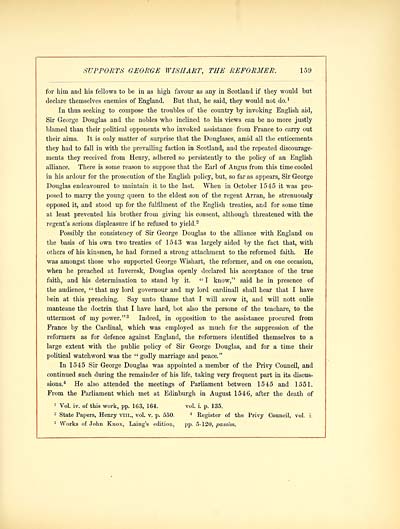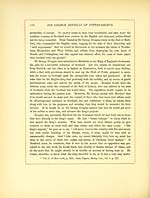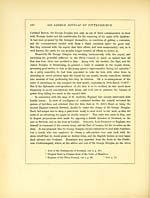Douglas book > Angus memoirs
(183) Page 159
Download files
Complete book:
Individual page:
Thumbnail gallery: Grid view | List view

SUPPORTS GEORGE WISH ART, THE REFORMER. 159
for him and his fellows to be in as high favour as any in Scotland if they would but
declare themselves enemies of England. But that, he said, they would not do. 1
In thus seeking to compose the troubles of the country by invoking English aid,
Sir George Douglas and the nobles who inclined to his views can be no more justly
blamed than their political opponents who invoked assistance from France to carry out
their aims. It is only matter of surprise that the Douglases, amid all the enticements
they had to fall in with the prevailing faction in Scotland, and the repeated discourage-
ments they received from Henry, adhered so persistently to the policy of an English
alliance. There is some reason to suppose that the Earl of Angus from this time cooled
in his ardour for the prosecution of the English policy, but, so far as appears, Sir George
Douglas endeavoured to maintain it to the last. When in October 1545 it was pro-
posed to marry the young queen to the eldest son of the regent Arran, he strenuously
opposed it, and stood up for the fulfilment of the English treaties, and for some time
at least prevented his brother from giving his consent, although threatened with the
regent's serious displeasure if he refused to yield. 2
Possibly the consistency of Sir George Douglas to the alliance with England on
the basis of his own two treaties of 1543 was largely aided by the fact that, with
others of his kinsmen, he had formed a strong attachment to the reformed faith. He
was amongst those who supported George Wishart, the reformer, and on one occasion,
when he preached at Inveresk, Douglas openly declared his acceptance of the true
faith, and his determination to stand by it. " I know," said he in presence of
the audience, "that my lord governour and my lord cardinall shall hear that I have
bein at this preaching. Say unto thame that I will avow it, and will nott onlie
manteane the doctrin that I have hard, bot also the persone of the teachare, to the
uttermost of my power." 3 Indeed, in opposition to the assistance procured from
France by the Cardinal, which was employed as much for the suppression of the
reformers as for defence against England, the reformers identified themselves to a
large extent with the public policy of Sir George Douglas, and for a time their
political watchword was the " godly marriage and peace."
In 1545 Sir George Douglas was appointed a member of the Privy Council, and
continued such during the remainder of his life, taking very frequent part in its discus-
sions. 4 He also attended the meetings of Parliament between 1545 and 1551.
From the Parliament which met at Edinburgh in August 1546, after the death of
1 Vol. iv. of thia work, pp. 163, 164. vol. i. p. 135.
3 State Papers, Henry viii., vol. v. p. 550. 4 Register of the Privy Council, vol. i.
3 Works of John Knox, Laing's edition, pp. 5-120, passim.
for him and his fellows to be in as high favour as any in Scotland if they would but
declare themselves enemies of England. But that, he said, they would not do. 1
In thus seeking to compose the troubles of the country by invoking English aid,
Sir George Douglas and the nobles who inclined to his views can be no more justly
blamed than their political opponents who invoked assistance from France to carry out
their aims. It is only matter of surprise that the Douglases, amid all the enticements
they had to fall in with the prevailing faction in Scotland, and the repeated discourage-
ments they received from Henry, adhered so persistently to the policy of an English
alliance. There is some reason to suppose that the Earl of Angus from this time cooled
in his ardour for the prosecution of the English policy, but, so far as appears, Sir George
Douglas endeavoured to maintain it to the last. When in October 1545 it was pro-
posed to marry the young queen to the eldest son of the regent Arran, he strenuously
opposed it, and stood up for the fulfilment of the English treaties, and for some time
at least prevented his brother from giving his consent, although threatened with the
regent's serious displeasure if he refused to yield. 2
Possibly the consistency of Sir George Douglas to the alliance with England on
the basis of his own two treaties of 1543 was largely aided by the fact that, with
others of his kinsmen, he had formed a strong attachment to the reformed faith. He
was amongst those who supported George Wishart, the reformer, and on one occasion,
when he preached at Inveresk, Douglas openly declared his acceptance of the true
faith, and his determination to stand by it. " I know," said he in presence of
the audience, "that my lord governour and my lord cardinall shall hear that I have
bein at this preaching. Say unto thame that I will avow it, and will nott onlie
manteane the doctrin that I have hard, bot also the persone of the teachare, to the
uttermost of my power." 3 Indeed, in opposition to the assistance procured from
France by the Cardinal, which was employed as much for the suppression of the
reformers as for defence against England, the reformers identified themselves to a
large extent with the public policy of Sir George Douglas, and for a time their
political watchword was the " godly marriage and peace."
In 1545 Sir George Douglas was appointed a member of the Privy Council, and
continued such during the remainder of his life, taking very frequent part in its discus-
sions. 4 He also attended the meetings of Parliament between 1545 and 1551.
From the Parliament which met at Edinburgh in August 1546, after the death of
1 Vol. iv. of thia work, pp. 163, 164. vol. i. p. 135.
3 State Papers, Henry viii., vol. v. p. 550. 4 Register of the Privy Council, vol. i.
3 Works of John Knox, Laing's edition, pp. 5-120, passim.
Set display mode to:
![]() Universal Viewer |
Universal Viewer | ![]() Mirador |
Large image | Transcription
Mirador |
Large image | Transcription
Images and transcriptions on this page, including medium image downloads, may be used under the Creative Commons Attribution 4.0 International Licence unless otherwise stated. ![]()
| Histories of Scottish families > Douglas book > Angus memoirs > (183) Page 159 |
|---|
| Permanent URL | https://digital.nls.uk/96533990 |
|---|
| Attribution and copyright: |
|
|---|---|
| Description | A selection of almost 400 printed items relating to the history of Scottish families, mostly dating from the 19th and early 20th centuries. Includes memoirs, genealogies and clan histories, with a few produced by emigrant families. The earliest family history goes back to AD 916. |
|---|

